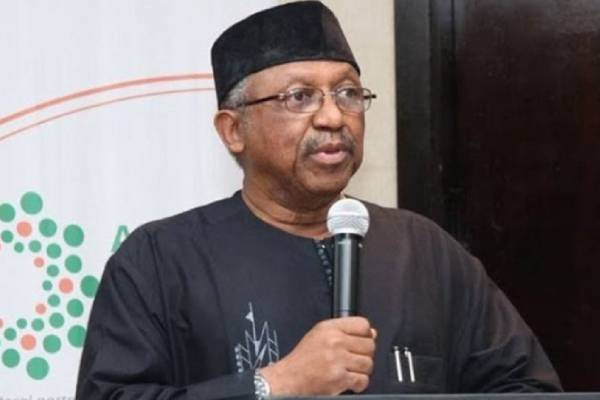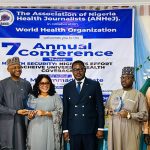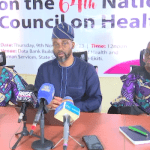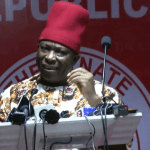The sixty third meeting of the national council on health has opened with focus on the need for the federal government to make deliberate efforts to reflect key pillars for health system strengthening.
This formed part of discussions at the meeting with the theme “building a resilient and sustainable health system for improved health outcomes and universal health coverage”.
Nigeria’s health care has been hit by the strain of dealing with the pandemic and the current battle to tame the internal outbreaks of Lassa fever, cholera and monkey pox.
It is now time, as the year comes to an end, to re strategize and make moves ahead of other epidemics and pandemics through recommendations of a paradigm shift towards promoting the health of citizens and preventing diseases.
This important strategic meeting of the health sector by the highest policy making body, is seeking to set the agenda for Nigeria’s health sector reform for universal health coverage.
The agenda take off from the world health organization’s highlight onsome of the key pillars of concentration
These include primary health care, local vaccine production, health insurance and climate change at the top of the list.
Experts here still believe that universal health coverage is still achievable through self auditing evaluation, starting from the states.
Participants here all admit that accelerating efforts towards building a resilient and sustainable health system will encourage national development.
There have been a growing outcry over what many experts and observers have termed Brain Drain in the Sector especially Doctors who have migrated in their Thousands to the United Kingdom in the last few years.
Many have identified factors such as poor remuneration, poor condition of service and lack of the proper up to date equipment to work with.
The charge by the National Council of Health for the Strengthening of the Sector may be a n admission that a lot is wrong with the sector and needs reforms and upgrade especially in terms Salaries, Allowances, Infrastructure and Equipment.
The sixty third meeting of the national council on health has opened with focus on the need for the federal government to make deliberate efforts to reflect key pillars for health system strengthening.
This formed part of discussions at the meeting with the theme “building a resilient and sustainable health system for improved health outcomes and universal health coverage”.
Nigeria’s health care has been hit by the strain of dealing with the pandemic and the current battle to tame the internal outbreaks of Lassa fever, cholera and monkey pox.
It is now time, as the year comes to an end, to re strategize and make moves ahead of other epidemics and pandemics through recommendations of a paradigm shift towards promoting the health of citizens and preventing diseases.
This important strategic meeting of the health sector by the highest policy making body, is seeking to set the agenda for Nigeria’s health sector reform for universal health coverage.
The agenda take off from the world health organization’s highlight onsome of the key pillars of concentration
These include primary health care, local vaccine production, health insurance and climate change at the top of the list.
Experts here still believe that universal health coverage is still achievable through self auditing evaluation, starting from the states.
Participants here all admit that accelerating efforts towards building a resilient and sustainable health system will encourage national development.
There have been a growing outcry over what many experts and observers have termed Brain Drain in the Sector especially Doctors who have migrated in their Thousands to the United Kingdom in the last few years.
Many have identified factors such as poor remuneration, poor condition of service and lack of the proper up to date equipment to work with.
The charge by the National Council of Health for the Strengthening of the Sector may be a n admission that a lot is wrong with the sector and needs reforms and upgrade especially in terms Salaries, Allowances, Infrastructure and Equipment.
The sixty third meeting of the national council on health has opened with focus on the need for the federal government to make deliberate efforts to reflect key pillars for health system strengthening.
This formed part of discussions at the meeting with the theme “building a resilient and sustainable health system for improved health outcomes and universal health coverage”.
Nigeria’s health care has been hit by the strain of dealing with the pandemic and the current battle to tame the internal outbreaks of Lassa fever, cholera and monkey pox.
It is now time, as the year comes to an end, to re strategize and make moves ahead of other epidemics and pandemics through recommendations of a paradigm shift towards promoting the health of citizens and preventing diseases.
This important strategic meeting of the health sector by the highest policy making body, is seeking to set the agenda for Nigeria’s health sector reform for universal health coverage.
The agenda take off from the world health organization’s highlight onsome of the key pillars of concentration
These include primary health care, local vaccine production, health insurance and climate change at the top of the list.
Experts here still believe that universal health coverage is still achievable through self auditing evaluation, starting from the states.
Participants here all admit that accelerating efforts towards building a resilient and sustainable health system will encourage national development.
There have been a growing outcry over what many experts and observers have termed Brain Drain in the Sector especially Doctors who have migrated in their Thousands to the United Kingdom in the last few years.
Many have identified factors such as poor remuneration, poor condition of service and lack of the proper up to date equipment to work with.
The charge by the National Council of Health for the Strengthening of the Sector may be a n admission that a lot is wrong with the sector and needs reforms and upgrade especially in terms Salaries, Allowances, Infrastructure and Equipment.
The sixty third meeting of the national council on health has opened with focus on the need for the federal government to make deliberate efforts to reflect key pillars for health system strengthening.
This formed part of discussions at the meeting with the theme “building a resilient and sustainable health system for improved health outcomes and universal health coverage”.
Nigeria’s health care has been hit by the strain of dealing with the pandemic and the current battle to tame the internal outbreaks of Lassa fever, cholera and monkey pox.
It is now time, as the year comes to an end, to re strategize and make moves ahead of other epidemics and pandemics through recommendations of a paradigm shift towards promoting the health of citizens and preventing diseases.
This important strategic meeting of the health sector by the highest policy making body, is seeking to set the agenda for Nigeria’s health sector reform for universal health coverage.
The agenda take off from the world health organization’s highlight onsome of the key pillars of concentration
These include primary health care, local vaccine production, health insurance and climate change at the top of the list.
Experts here still believe that universal health coverage is still achievable through self auditing evaluation, starting from the states.
Participants here all admit that accelerating efforts towards building a resilient and sustainable health system will encourage national development.
There have been a growing outcry over what many experts and observers have termed Brain Drain in the Sector especially Doctors who have migrated in their Thousands to the United Kingdom in the last few years.
Many have identified factors such as poor remuneration, poor condition of service and lack of the proper up to date equipment to work with.
The charge by the National Council of Health for the Strengthening of the Sector may be a n admission that a lot is wrong with the sector and needs reforms and upgrade especially in terms Salaries, Allowances, Infrastructure and Equipment.
The sixty third meeting of the national council on health has opened with focus on the need for the federal government to make deliberate efforts to reflect key pillars for health system strengthening.
This formed part of discussions at the meeting with the theme “building a resilient and sustainable health system for improved health outcomes and universal health coverage”.
Nigeria’s health care has been hit by the strain of dealing with the pandemic and the current battle to tame the internal outbreaks of Lassa fever, cholera and monkey pox.
It is now time, as the year comes to an end, to re strategize and make moves ahead of other epidemics and pandemics through recommendations of a paradigm shift towards promoting the health of citizens and preventing diseases.
This important strategic meeting of the health sector by the highest policy making body, is seeking to set the agenda for Nigeria’s health sector reform for universal health coverage.
The agenda take off from the world health organization’s highlight onsome of the key pillars of concentration
These include primary health care, local vaccine production, health insurance and climate change at the top of the list.
Experts here still believe that universal health coverage is still achievable through self auditing evaluation, starting from the states.
Participants here all admit that accelerating efforts towards building a resilient and sustainable health system will encourage national development.
There have been a growing outcry over what many experts and observers have termed Brain Drain in the Sector especially Doctors who have migrated in their Thousands to the United Kingdom in the last few years.
Many have identified factors such as poor remuneration, poor condition of service and lack of the proper up to date equipment to work with.
The charge by the National Council of Health for the Strengthening of the Sector may be a n admission that a lot is wrong with the sector and needs reforms and upgrade especially in terms Salaries, Allowances, Infrastructure and Equipment.
The sixty third meeting of the national council on health has opened with focus on the need for the federal government to make deliberate efforts to reflect key pillars for health system strengthening.
This formed part of discussions at the meeting with the theme “building a resilient and sustainable health system for improved health outcomes and universal health coverage”.
Nigeria’s health care has been hit by the strain of dealing with the pandemic and the current battle to tame the internal outbreaks of Lassa fever, cholera and monkey pox.
It is now time, as the year comes to an end, to re strategize and make moves ahead of other epidemics and pandemics through recommendations of a paradigm shift towards promoting the health of citizens and preventing diseases.
This important strategic meeting of the health sector by the highest policy making body, is seeking to set the agenda for Nigeria’s health sector reform for universal health coverage.
The agenda take off from the world health organization’s highlight onsome of the key pillars of concentration
These include primary health care, local vaccine production, health insurance and climate change at the top of the list.
Experts here still believe that universal health coverage is still achievable through self auditing evaluation, starting from the states.
Participants here all admit that accelerating efforts towards building a resilient and sustainable health system will encourage national development.
There have been a growing outcry over what many experts and observers have termed Brain Drain in the Sector especially Doctors who have migrated in their Thousands to the United Kingdom in the last few years.
Many have identified factors such as poor remuneration, poor condition of service and lack of the proper up to date equipment to work with.
The charge by the National Council of Health for the Strengthening of the Sector may be a n admission that a lot is wrong with the sector and needs reforms and upgrade especially in terms Salaries, Allowances, Infrastructure and Equipment.
The sixty third meeting of the national council on health has opened with focus on the need for the federal government to make deliberate efforts to reflect key pillars for health system strengthening.
This formed part of discussions at the meeting with the theme “building a resilient and sustainable health system for improved health outcomes and universal health coverage”.
Nigeria’s health care has been hit by the strain of dealing with the pandemic and the current battle to tame the internal outbreaks of Lassa fever, cholera and monkey pox.
It is now time, as the year comes to an end, to re strategize and make moves ahead of other epidemics and pandemics through recommendations of a paradigm shift towards promoting the health of citizens and preventing diseases.
This important strategic meeting of the health sector by the highest policy making body, is seeking to set the agenda for Nigeria’s health sector reform for universal health coverage.
The agenda take off from the world health organization’s highlight onsome of the key pillars of concentration
These include primary health care, local vaccine production, health insurance and climate change at the top of the list.
Experts here still believe that universal health coverage is still achievable through self auditing evaluation, starting from the states.
Participants here all admit that accelerating efforts towards building a resilient and sustainable health system will encourage national development.
There have been a growing outcry over what many experts and observers have termed Brain Drain in the Sector especially Doctors who have migrated in their Thousands to the United Kingdom in the last few years.
Many have identified factors such as poor remuneration, poor condition of service and lack of the proper up to date equipment to work with.
The charge by the National Council of Health for the Strengthening of the Sector may be a n admission that a lot is wrong with the sector and needs reforms and upgrade especially in terms Salaries, Allowances, Infrastructure and Equipment.
The sixty third meeting of the national council on health has opened with focus on the need for the federal government to make deliberate efforts to reflect key pillars for health system strengthening.
This formed part of discussions at the meeting with the theme “building a resilient and sustainable health system for improved health outcomes and universal health coverage”.
Nigeria’s health care has been hit by the strain of dealing with the pandemic and the current battle to tame the internal outbreaks of Lassa fever, cholera and monkey pox.
It is now time, as the year comes to an end, to re strategize and make moves ahead of other epidemics and pandemics through recommendations of a paradigm shift towards promoting the health of citizens and preventing diseases.
This important strategic meeting of the health sector by the highest policy making body, is seeking to set the agenda for Nigeria’s health sector reform for universal health coverage.
The agenda take off from the world health organization’s highlight onsome of the key pillars of concentration
These include primary health care, local vaccine production, health insurance and climate change at the top of the list.
Experts here still believe that universal health coverage is still achievable through self auditing evaluation, starting from the states.
Participants here all admit that accelerating efforts towards building a resilient and sustainable health system will encourage national development.
There have been a growing outcry over what many experts and observers have termed Brain Drain in the Sector especially Doctors who have migrated in their Thousands to the United Kingdom in the last few years.
Many have identified factors such as poor remuneration, poor condition of service and lack of the proper up to date equipment to work with.
The charge by the National Council of Health for the Strengthening of the Sector may be a n admission that a lot is wrong with the sector and needs reforms and upgrade especially in terms Salaries, Allowances, Infrastructure and Equipment.














